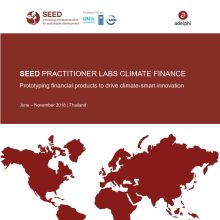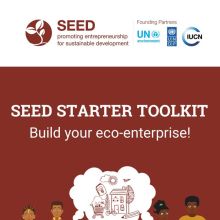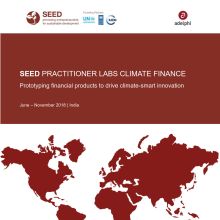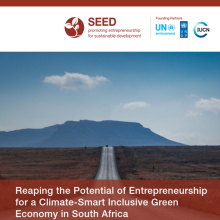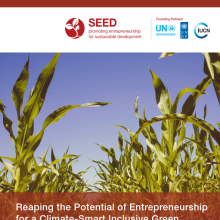- SEED ha trabajado estrechamente con el Instituto Internacional para el Desarrollo Sostenible (IIDS) desde 2007 en un programa de investigación para aumentar el conocimiento técnico y la comprensión de las pequeñas empresas sociales y ambientales. Sobre la base de la investigación y las consultas de los simposios, SEED pudo publicar el siguiente Análisis para los responsables de la creación de políticas, que ofrecen nuevas perspectivas sobre el papel de las microempresas y las pequeñas empresas sociales y ambientales como actores esenciales en la construcción de economías verdes.
This report includes interpretation and commentary to stimulate debate on the role and potential of locally-driven partnerships for sustainable development.
This paper provides an analysis of the partnerships which applied to the SEED Awards in 2005 and demonstrates the wide variety of locally-driven entrepreneurial partnerships with the potential to contribute to sustainable development.
This Briquettes from Biomass: Replicator Workbook preview provides insights and tools to entrepreneurs seeking to start-up to transform biowaste to a valuable and green energy source. Our SEED Replicator Workbooks were developed to guide entrepreneurs through the process of transferring a proven successful business model to another geographic location using hands-on SEED tools and business model insights.
This Plastic Upcycling: Replicator Workbook preview provides insights and tools to entrepreneurs seeking to start-up an enterprise that converts solid plastic waste into valueable products. Our SEED Replicator Workbooks were developed to guide entrepreneurs through the process of transferring a proven successful business model to another geographic location using hands-on SEED tools and business model insights.
This From Beehives to Market: Replicator Workbook preview provides insights and tools to entrepreneurs seeking to start-up an enterprise that capitalises on the many opportunities for processing and value-addition for known primary bee products. Our SEED Replicator Workbooks were developed to guide entrepreneurs through the process of transferring a proven successful business model to another geographic location using hands-on SEED tools and business model insights.
This Green Products for Health and Sanitation: Replicator Workbook preview provides insights and tools to entrepreneurs seeking to start-up an enterprise that explores converting organic material into health and daily sanitation products. Our SEED Replicator Workbooks were developed to guide entrepreneurs through the process of transferring a proven successful business model to another geographic location using hands-on SEED tools and business model insights.
This Irrigation Solutions For Smallholder Farmers: Replicator Workbook preview provides insights and tools to entrepreneurs seeking to start-up an enterprise in the market for irrigation technologies. Our SEED Replicator Workbooks were developed to guide entrepreneurs through the process of transferring a proven successful business model to another geographic location using hands-on SEED tools and business model insights.
This Local Clean Cookstove Enterprises: Replicator Workbook preview provides insights and tools to entrepreneurs seeking to start-up an enterprise in the market for clean cookstoves and opportunities along the value chain. Our SEED Replicator Workbooks were developed to guide entrepreneurs through the process of transferring a proven successful business model to another geographic location using hands-on SEED tools and business model insights.
This Waste to Biogas: Replicator Workbook preview provides insights and tools to entrepreneurs seeking to start-up an enterprise that converts organic waste to energy. Our SEED Replicator Workbooks were developed to guide entrepreneurs through the process of transferring a proven successful business model to another geographic location using hands-on SEED tools and business model insights.
This Collaborative Business Models for Smallholder Farming: Replicator Workbook preview provides insights and tools to entrepreneurs seeking to start-up an enterprise that improves livelihoods of individual smallholder farmers together. Our SEED Replicator Workbooks were developed to guide entrepreneurs through the process of transferring a proven successful business model to another geographic location using hands-on SEED tools and business model insights.
This Agricultural Product Processing: Replicator Workbook preview provides insights and tools to entrepreneurs seeking to start-up an enterprise that converts local natural raw materials into value-added products. Our SEED Replicator Workbooks were developed to guide entrepreneurs through the process of transferring a proven successful business model to another geographic location using hands-on SEED tools and business model insights.
This Driving Sustainable Community Development through Bottom-up Solar Energy Innovation: Replicator Workbook preview provides insights and tools to entrepreneurs seeking to start-up an enterprise that capitalises on income generation of innovative bottom-up solar energy products. Our SEED Replicator Workbooks were developed to guide entrepreneurs through the process of transferring a proven successful business model to another geographic location using hands-on SEED tools and business model insights.
- This Last Mile Distribution Enterprises: Replicator Workbook preview provides insights and tools to entrepreneurs seeking to start-up an enterprise that tackles market inaccessibility in remote areas by spreading benefits of solar power through last mile distribution. Our SEED Replicator Workbooks were developed to guide entrepreneurs through the process of transferring a proven successful business model to another geographic location using hands-on SEED tools and business model insights.
- This Innovative Solar Energy Solutions for Marginalised Customers: Replicator Workbook preview provides insights and tools to entrepreneurs seeking to start-up an enterprise that tackles the lack of access to energy for poor people into tailored off-grid solutions for BOP customers. Our SEED Replicator Workbooks were developed to guide entrepreneurs through the process of transferring a proven successful business model to another geographic location using hands-on SEED tools and business model insights.
The 2018 SEED Practitioner Labs Climate Finance series in India, Thailand and Uganda brought together around 200 leading practitioners to jointly prototype tangible solutions to major climate finance challenges. This report summarises the innovative climate finance products developed as part of the SEED Labs process in Uganda in primary partnership with Swisscontact, UNFCCC Regional Collaboration Centre – Kampala, and FSD Uganda with UK Aid.
- The 2018 SEED Practitioner Labs Climate Finance series in India, Thailand and Uganda brought together around 200 leading practitioners to jointly prototype tangible solutions to major climate finance challenges. This report summarises the innovative climate finance products developed as part of the SEED Labs process in Thailand in primary partnership with Global Mangrove Trust with KX, Last of Ours with KX, South Pole and RCC UNFCC/IGES with UNDP.
This Waste to Industrial Resources: Replicator Workbook preview provides insights and tools to entrepreneurs seeking to start-up an enterprise that converts solid waste such as glass, metals, paper and plastic into industrial resources. Our SEED Replicator Workbooks were developed to guide entrepreneurs through the process of transferring a proven successful business model to another geographic location using hands-on SEED tools and business model insights.
- This ICT Solutions for Agriculture: Replicator Workbook preview provides insights and tools to entrepreneurs seeking to start-up an enterprise in the market for ICT solutions along inclusive agriculture value chains. Our SEED Replicator Workbooks were developed to guide entrepreneurs through the process of transferring a proven successful business model to another geographic location using hands-on SEED tools and business model insights.
- This Sustainable Tourism Enterprises: Replicator Workbook preview provides insights and tools to entrepreneurs seeking to start-up an enterprise that explores opportunities along the tourism value chain. Our SEED Replicator Workbooks were developed to guide entrepreneurs through the process of transferring a proven successful business model to another geographic location using hands-on SEED tools and business model insights.
- This SEED Starter Toolkit preview provides a glimpse into the variety of hands-on business planning tools and processes used by participants of the SEED Starter programme. Our SEED Starter programme guides participants from the early stages of ideation to the generation of a viable business plan used to launch an eco-inclusive enterprise. Participants join together in teams during Starter workshops to blueprint and refine their business plans with the support of peer-learning, expert guidance and the full SEED Starter Toolkit.
- The 2018 SEED Practitioner Labs Climate Finance series in India, Thailand and Uganda brought together around 200 leading practitioners to jointly prototype tangible solutions to major climate finance challenges. This report summarises the innovative climate finance products developed as part of the SEED Labs process in India in primary partnership with TARA with Grameen Capital, New Ventures and GIZ with VNV Advisory.
- In a global context of commitments to sustainable development and the mitigation of and adaptation to climate change, Malawi has set out ambitious agendas to increase resilience to climate change and move towards a green and inclusive economy. Translating these ambitious agendas into impact at the community level requires concerted efforts in the decentralisation of policy initiatives and capacity building of local actors. SMMEs play a key role in aligning local markets to national development goals, and can have a transformational impact on the achievement of these goals. Drawing on discussions from the SEED policy dialogue and labs process in Malawi, this policy brief presents recommendations to policy makers for leveraging the potential of SMMEs to transform the agriculture, waste, and clean energy sectors in Malawi, and across Southern Africa.
- With lessons drawn from an 8-month policy prototyping labs cycle in South Africa and over fifteen years of enterprise support, this policy brief presents three recommendations for policymakers to improve SMME access and contribution to climate change adaptation markets. These recommendations include (1) increasing availability of and access to market information, (2) creating support pipelines between public and private stakeholders, and (3) leveraging intermediaries as key contributors to the implementation and evaluation of market access policies.
The transition to a green, inclusive, and climate-smart South Africa requires collaborative efforts from the public sector, civil society, and private sector. As small and growing enterprises are an essential driver of growth, particularly in emerging economies, cross-sector partnerships to co-create an enabling environment for enterprises with inclusive and climate-smart business models are critical. This policy landscape paper provides a snapshot of the ecosystem in which eco-inclusive, climate-smart small and growing enterprises operate. By identifying areas where further support is needed, this paper is connected to the SEED Policy Prototyping Programme, in which stakeholders across sectors collaborate to co-create policy instruments designed to build a more enabling ecosystem for eco-inclusive entrepreneurs.
- The transition to a green, inclusive, and climate-smart Malawi requires collaborative efforts from the public sector, civil society, and the private sector. Micro, small and medium-sized enterprises (MSMEs) are important drivers of growth in Malawi, particularly in emerging economies, andmaking cross-sector partnerships are critical to co-creatinge an enabling environment for enterprises with inclusive and climate-smart business models. This input paper provides a snapshot of the ecosystem in which eco-inclusive small and growing enterprises operate. By identifying areas where further support is needed, this paper serves as an input to the SEED Policy Prototyping Programme, in which stakeholders across sectors collaborate to co-create policy instruments designed to build a more enabling ecosystem for eco-inclusive entrepreneurs.
- This Innovation Brief presents six innovative bottom-up adaptation financing approaches from the SEED Practitioner Labs Climate Finance 2018 in India, Thailand and Uganda, and shares overarching learnings about challenges and solutions. The Labs support creativity, innovation, and co-creation through its participative and collaborative prototyping methodology. Through this approach, the Labs facilitated the development of various prototype solutions for adaptation financing with a focus on SMEs.
- Small and growing enterprises are key drivers of development and employment. They account for 50% of the jobs globally, and contribute well over 35% towards the GDP of emerging economies. SEED particularly supports eco-inclusive enterprises; small, micro and medium-sized enterprises operating at the community level. They offer innovative solutions to common social and environmental issues, but also strengthen local economies. But what exactly is their impact? Can we quantify it, and how do we stimulate it? Have a look at our 2020 SEED Impact Snapshot, a snapshot of the impact of Asia an Africa based eco-inclusive enterprises on the SDGs.
- Despite the goals put forward in the Paris Agreement and commitments by countries in their nationally determined contributions (NDCs) the concentration of greenhouse gases in the atmosphere is rising (WMO 2019). It is, therefore, more important than ever for countries to step up their ambition and NDC commitments in 2020. The COP25 climate negotiations will pave the way for the next year and the NDC update processes. These open up the opportunity to acknowledge a modest yet potentially impactful group of players for ambitious climate action: small- and medium-sized enterprises (SMEs).




